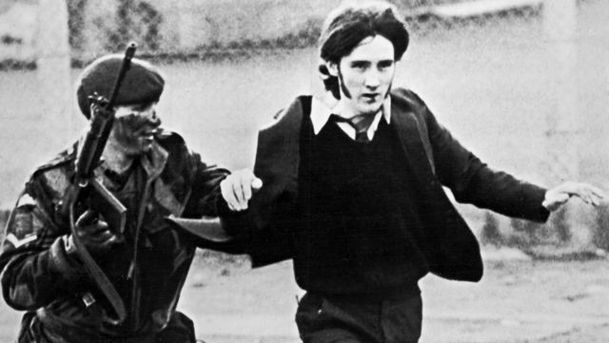Friday Play - Bloody Sunday: Scenes from the Saville Inquiry - Episode 1

Bloody Sunday remains one of the most controversial issues in Northern Ireland; it has been over 12 years since Tony Blair announced an inquiry into the events of that day. Lord Saville's Report will be published on Tuesday the 15th June. Bloody Sunday: Scenes from the Saville Inquiry is a compelling and moving dramatisation based on the testimony of civilians and soldiers who were there. Bloody Sunday: Scenes from the Saville Inquiry Part one of a two part dramatisation of the Saville Inquiry into the events of Sunday the 30th January, 1972 - Bloody Sunday. Part one focuses on the testimony of civilians who witnessed the events. The transcripts are edited but not re-written and the sequence of the evidence has not been altered. Adapted from The Tricycle Theatre production. Introduction Mark Penfold Lord Saville Alan Parnaby Christopher Clarke QC Thomas Wheatley Bishop Edward Daly Michael O'Hagan Michael Mansfield QC Terrence Hardiman Edwin Glasgow QC James Woolley Michael Bridge Charles Lawson Bernadette McAliskey Julia Dearden Cathryn McGahey Hilary Maclean William Patrick McDonagh David Beames Geraldine McBride Heather Tobias General Sir Robert Ford Michael Cochrane Introduction and Radio Adaptation by Richard Norton Taylor Directed by Nicolas Kent Produced by Stephen Wright Promo Note. On the 29th of January, 1998 the then Prime Minister Tony Blair tabled the following resolution in the House of Commons. "That it is expedient that a Tribunal be established for inquiring into a definite matter of urgent public importance, namely the events on Sunday, 30 January 1972 which led to loss of life in connection with the procession in Londonderry on that day, taking account of any new information relevant to events on that day." It has been over 12 years since Tony Blair announced the inquiry under Lord Saville into the events of the 30th January, 1972 - Bloody Sunday. Evidence was heard between 1998 and 2005; Lord Saville's report will be published on the 15th June, 2010. On Bloody Sunday, 13 civilians were killed by soldiers of the British Parachute Regiment who opened fire during a civil rights march. A 14th person died later as a result of their injuries. The day after the incident, Edward Heath set up a public inquiry under the then Lord Chief Justice, Lord Widgery. Lord Widgery produced a report within 11 weeks of Bloody Sunday. The families of the victims considered it to be flawed and that it failed to establish the truth. In 1992, John Major stated that those shot should be regarded as innocent of any allegation that they were shot while handling firearms or explosives. Pressure for a new inquiry reached a peak in 1997, after a sustained campaign by relatives of the 14 people who died. The families provided the Conservative Government with a new dossier and the Irish Government also sent that government a detailed assessment of new material including new eyewitness accounts, new interpretation of ballistic evidence and new medical evidence. Bloody Sunday is considered to be a watershed that contributed to the resurgence of the IRA in 1972, the suspension of the Northern Ireland government in March 1972, and direct rule from London. Devolved government was eventually restored in May 2007. The Bloody Sunday Inquiry is a 2-part radio adaptation of The Tricycle Theatre's production based on the transcripts of the Lord Saville's tribunal. The transcripts are edited to 2 hours of compelling drama as civilians and soldiers give their evidence about what happened on that day. The testimony is edited but not re-written and the sequence of the evidence has not been altered. Nicolas Kent, Richard Norton Taylor and the Tricycle Theatre have led the way with this style of verbatim theatre. Previous productions for the BBC include: Half the Picture - the Scott Arms to Iraq Inquiry, Nuremberg - the 1946 War Crimes Trial, Srebrenica - the 1996 U.N. rule 61 hearings at the Hague, The Colour of Justice - The Stephen Lawrence Inquiry, Justifying War - The Hutton Inquiry, & Called to Account: the indictment of Charles Anthony Lynton Blair for the crime of aggression in Iraq - a hearing.